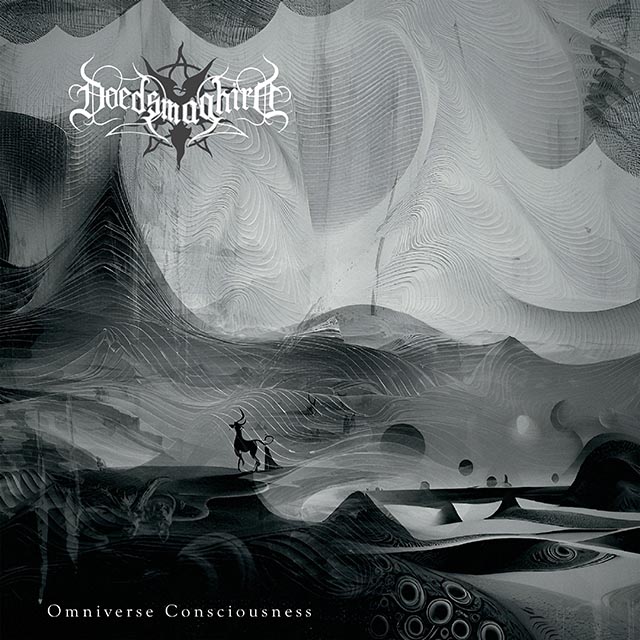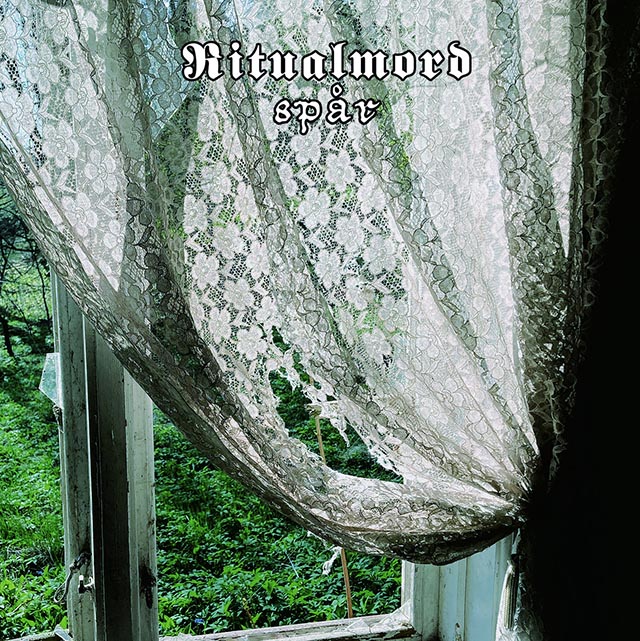How does one begin to review genius of a type so rare as to completely smash one’s perception of art and embody its new height? In such a case, one must instead be content to adore and worship. The Dødheimsgard and Ved Buens Ende legend Yusaf “Vicotnik” Parvez creates experiences so engaging that they absolutely demand active participation from audiences, thereby obligating us to assimilate them into the fabric of our beings. If we’ve managed to receptively open ourselves to them, these sonic journeys become friends for life. Thus, the possibility of objectivity in the traditional sense is obliterated.
Mr. Parvez has finally revealed Omniverse Consciousness, the debut by Doedsmaghird, the sister project of Dødheimsgard. Yusaf clarified in advance that Doedsmaghird would have a freeze-frame sort of stance in relation to Dødheimagard’s past endeavors. Doedsmaghird likewise signifies Yusaf’s musical partnership with his brother in shared purpose, Camille Giraudeau, who belongs to a newer generation and has mined inspiration from him. (Check out Camille’s Dreams of the Drowned cover of Ved Buens Ende’s “Coiled in Wings” with guest vocals by ex-Dødheimsgard’s Aldrahn.) Omniverse Consciousness turns those with the ears to hear into lunatics oozing levels of praise that can only be described as lethal. Meanwhile, attempting to fathom and analyze the bottomless depths of Yusaf’s masterpieces might just also trigger panic attacks. If the merits of a creative work can be measured by the extent to which it worms inside even the most curmudgeonly listeners and transforms them, then I can, after all, objectively state that Omniverse Consciousness tops the charts and shatters the scales.
Dødheimagard’s A Umbra Omega (2015) represents the pinnacle of black metallic glory, leaving me without a clue as to how the band would follow up such a sublime effort while honoring their tradition of forging something new with each album. Taking root from A Umbra’s “Architect of Darkness” but growing into a never-before-heard type of gorgeous sonic monster, the volatile Black Medium Current (2023) somehow surpassed already ridiculously high expectations. It proved to be another one of the greatest releases of all time, in my correct opinion, which is shared by others. The phantasmagorical and psychedelic wonder that is Black Medium Current seems to be the most immersive offering I’ve heard — a virtual-reality race into the heart of truth and insanity alike. As I said, or at least tried to say upon the record’s unveiling: If not for the tender nostalgia for the early black metal scene contained on Black Medium Current, this triumph would make me want to burn almost all of my other records that aren’t by Vicotnik. I will, however, spare recordings by Kvarforth; Tor-Helge “Cernunnus” Skei; Strid, of which Vicotnik has acted as a member for roughly 15 years but has not released content with as of yet; the guy who made Filosofem; and perhaps a couple of others. If you are what you consume, why fill one’s ears with anything less than the best?!
Omniverse Consciousness functions as a companion to Black Medium Current. It additionally serves as an exploration of what would have happened if Dødheimsgard had made a title between the classic EP Satanic Art (1998) and the equally ingenious full-length 666 International (1999). Trying to dissect Omniverse Consciousness, which is perfect both as a bridge and when viewed as a self-contained effort, “is like a child taking apart a clock to understand time,” in the words of Proust. Therefore, I’m going to be a bit humble here and refrain from getting too specific in many respects. At this stage, I am simply too busy repeating, “Oh my God!,” when listening to Omniverse Consciousness. It’s been years since I first heard A Umbra, for example, and have I fully processed it?! No! I haven’t even digested the wicked potions that are Satanic Art and 666 International. What would make me think I have wrapped my little head around Omniverse Consciousness in the short time I’ve had it?
Therein lies part of the genius of the artistically unlimited Vicotnik: His music is so radically innovative that even longtime fans may not comprehend it at first. That has been so to the degree that they have literally attempted to physically assault the venerable master for changing stylistically, or rather, following his own truth, taking the difficult route, and expanding. And, no, by that, I do not mean to imply that any of his albums are better than the others, but rather, that Yusaf will never clone his own peaks. Again, each of his releases is a different star in the magnificent constellation of his illustrious career. To borrow a quote from “Architect of Darkness,” Omniverse Consciousness is not “Ritual re-enactment in selfsame glory.” Back to those disagreeable listeners: Many of them have returned to admit that they were wrong and reveal that the records to which they originally objected eventually came to rank among their favorites with time, so don’t pass any judgment upon Omniverse Consciousness until you have lived with it for a while.
When a slightly different incarnation of what has become Omniverse Consciousness’ third track, “Then, to Darkness Return,” dropped on Peaceville’s Dark Side of the Sacred Star compilation, I wrote the following about it and Dødheimsgard’s “Stemmen fra Evigheten”: “Not only are these masterpieces worthy of your tears, but they are among the greatest I’ve heard. Whereas most skilled musicians paint vivid images before you, Vicotnik takes matters further by sculpting, often entire galaxies, around you. Cerebral, poetic, and inventive beyond your wildest dreams, his art belongs in a museum.” I still 100% stand behind these words and can now gladly apply them to the whole of Omniverse Consciousness. Yusaf carves out hollows within his creations in which we can dwell and reap infinite benefits.
Yusaf may have spoken about shut doors on Black Medium Current, but by confronting them, he both opens new mental rooms and drags us into the abyss. One possible takeaway from Black Medium Current is the realization that these barriers can help us understand that we were not meant to be in certain places anyway, thus stopping our minds from spinning in pain, or at least at times. And, yes, we feel fortunate to be inhabiting Omniverse Consciousness because whatever catastrophic events brought us here, or more accurately, sucked me into the realm of black metal from the land of classical music and Russian rock, certainly did so for a reason; if my personal downfall led me to discover Omniverse Consciousness through a long and winding road, then I have to be grateful. Thankfully, the region of outer space that Black Medium Current shows us seems, in my interpretation, more or less as its cover suggests, delightfully pitch-black with streaks of brilliant and glowing colors. By contrast, the world of Omniverse Consciousness can perhaps be summarized as a softer-hued rainbow in a gray sky, as Proust’s description of one of Albertine’s garments. The albums are different types of psychedelic trips, with the newer being less explosive in terms of unpredictability but no less powerful and evocative.
Of course, the compositions and musicianship on Omniverse Consciousness are flawless. As we expect from Yusaf, electronic components are brilliantly implemented. Yusaf has expressed that he didn’t want Black Medium Current to be like theater. Nevertheless, of course, while remaining totally authentic, both Black Medium Current and Omniverse Consciousness are theatrical in the admirable and artistic sense of the word, given Yusaf’s individualistic flare, elevated approach, and finesse. Yusaf’s varied vocals could put any trained thespian to shame, and, unsurprisingly, Yusaf shared with us that he actually has a history with the theater. Ole Teigen’s piano on “Endeavour” adds enormously to the sophistication, emotion, and more, just as the keys by the likes of Svein Egil Hatlevik and Lars-Emil Maløy have benefited Dødheimsgard. Although, again, Omniverse Consciousness is pure art, there is also clearly a science involved, and the songs sometimes lend the impression of an after-hours experiment undertaken by a white-coated fellow at the end of his rope.
In addition to musical links, there are definitely lyrical similarities between Black Medium Current and Omniverse Consciousness. The latter features the key expression, “rabbit hole,” which Yusaf has used during interviews to describe where it, Black Medium Current, and A Umbra lead us, though Yusaf has constantly been wrestling with many of the concepts at hand much longer. Surfaces, certainty, belief, and so forth continue to melt and crumble, hence triggering terror and, if you are the right type of listener, ecstasy. After all, occupying the space beyond knowledge can prove quite rewarding, even if it may not be all that fun to wipe away that smile wrought of compulsion on Black Medium Current, or that courageously ignorant one on Omniverse Consciousness; Yusaf exposes the ouroboric nature of the ego, warning against self-seduction and flattery. Black Medium Current suggests, “Identity is a drug from oblivion,” and the idea of identity as something temporary continues on Omniverse Consciousness: “Now withdraw from the trust in your name.”
Verily, Black Medium Current and Omniverse Consciousness inject doses of truth so pure as to inflict pain. They not only force you to question yourself, but they will also cause you to wrestle with the definition of Being. Despite the drugs supplied, Yusaf’s work simultaneously pulls away certain figurative opiates, and by doing so, it challenges your self-understanding and thrusts you into states of existential despair. In the end, surrendering to different moods, such as confusion and angst, are preconditions for intellectual honesty. Yusaf ultimately coerces us into becoming exactly that, more intellectually honest, and, as a result, we become more in touch with ourselves. Like Yusaf’s other accomplishments, Omniverse Consciousness fulfills the Proustian function of exploring Memory while triggering specific memories. You cannot stop contemplating Omniverse Consciousness and the traces of reality it calls to mind because it holds up a mirror to the listener, thus amounting to a journey that just must be constantly re-experienced.
Because some parallels between Omniverse Consciousness and Black Medium Current were touched upon during my recent interview with Vicotnik, I will refrain from being too repetitive, but I will note again that the “veil,” with which Vicotnik literally drapes himself during concerts, returns to be named twice on Omniverse Consciousness. Last year, when discussing Black Medium Current, Yusaf explained to me that he was inspired by the concept of “the veil of ignorance,” which ties into empathy. Indeed, Yusaf grapples with what are typically regarded as good values in his current music. At the same time, if the truth exists in synthesis, then, yes, Yusaf perfectly balances the light with the darkness and incorporates all colors of the wheel. In fact, the blackness birthed by Yusaf belongs to the most profound sort, reminding us of the immortal words of the forever dazzling Sir Niklas Kvarforth from a song that Yusaf assisted in spawning: “There is a darkness blacker, Than anything ever seen by man, So violent…”
The lyrics to “Min Tid er Omme,” the title of which reminds me of that of Fleurety’s first full-length, were penned by a friend of Vicotnik’s, Ole Svensli, before he tragically committed suicide. Considering the mention of a fist and betrayal as well as the theme of failure, I originally suspected that this gem was intended to mirror Black Medium Current’s “Det Tomme Kalde Mørke,” though the style could be said to be slightly different from Vicotnik’s. The music that Vicotnik composed for Ole’s text is thoroughly mesmerizing and transportive. The gorgeous poem for “Sparker inn Åpne Dører” was written by another friend of Vicotnik’s, Frode Ophsal, who, at the time, was in the midst of a downward spiral. Again, we have lines that stun with their suffocating might. It’s difficult to believe that Frode is not a seasoned writer, but, then again, we feared becoming too nosy when in conversation with Yusaf, so who knows?! Frode’s use of doors within the song’s imagery enhances its compatibility with Yusaf’s other material and makes us wonder if he wasn’t perhaps trying to craft something that would relate both positively and negatively to, let’s say, Black Medium Current’s “Interstellar Nexus.” There is a part of this track with chanting that seems reminiscent of a section from Black Medium Current‘s first number, the miraculous “Et Smelter.” As it happens, Frode and Ole’s contributions are the only two Norwegian-language songs on Omniverse Consciousness. That is fascinating since Vicotnik has remarked that, as a Norwegian, he feels that using the English language can be limiting, but don’t often supposed limitations push us to do our best work?!
On Omniverse Consciousness, Yusaf declares: “This is why we must fail, In all our beliefs, To honor the title of man to warrant the crown.” It has been nearly 30 years since Dødheimsgard’s full-length debut, Kronet til Konge, or “Crowned to Be King.” On Black Medium Current, Yusaf proclaimed the king to be dead, that we travel in defeat toward Dødheimsgard, and also that “freedom looks like failure from the enclosure…” All of that leaves me questioning whatever I once perceived to be crowning achievements in general along with the chimera that some dub meaning, as the ghosts of my past, “they run.” Ultimately, what I do know is that Omniverse Consciousness and the rest of Yusaf’s catalogue equate to a regal and epic victories that permits us to develop a greater sense of personal freedom and other treasures. Furthermore, for the millionth time by Yusaf’s hand, Omniverse Consciousness gifts us the “curse” of love, and nothing “could be worse” or better. I have much more to say on the matter. This could certainly be a never-ending review… Therefore, I’ll see you in a year for part two. In the meantime, I will be here reciting the following lines from A Umbra Omega to myself daily, sometimes hourly, like a parrot:
“Smothered by spiral repetition
Trapped to endure another day
Over and over until collision
And doubt offers new beginnings
I linger inside my death (and re-birth)…”
Rating: 5/5













